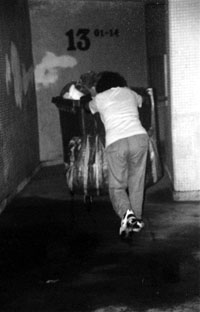Women Cleaners Under the Exploitation of Subcontracting in Hong Kong
Confronted with the impact of economic restructuring, many women workers displaced from the manufacturing sector ended up in cleaning jobs. The job nature is generally unpleasant, labour-intensive and lowly-paid, and associated with low status. Out of the six million people in Hong Kong, more than 2 million are living in public housing estates. There are about 166 public housing estates, employing over 15,000 cleaners. With the privatisation of public services, all of this cleaning work is subcontracted to private cleaning companies which in turn subcontract the work of each housing block to individual cleaners or the next line of subcontractors.
Cleaners are unscrupulously exploited under the subcontracting system. Normally companies which offer the lowest bid can get the contract from the Housing Authority, a government-subsidised statutory body that is virtually the landlord. To ensure a high profit mark-up, cleaning companies often employ the following management tactics:

Thus some cleaners are not directly employed by the cleaning companies, and they are not protected under the labour ordinance. In case of work injury, they are not
Most cleaners are women living in the same housing estate, with bonded domestic and childcare responsibilities. Even though the pay is low and the working condition is harsh, they still accept the job because the working hours fit into their responsibility at home. With limited alternatives, the cleaning job at least provides them with some needed income, and allow them to cope with the dual responsibility as a worker and care-tender.
(more pictures on page 2)
Next Page